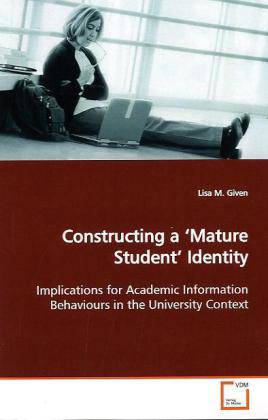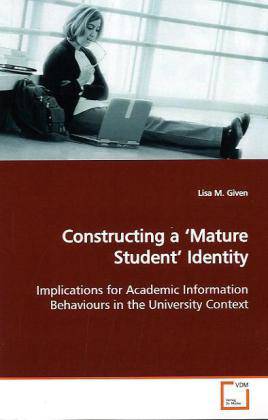
- Afhalen na 1 uur in een winkel met voorraad
- Gratis thuislevering in België vanaf € 30
- Ruim aanbod met 7 miljoen producten
- Afhalen na 1 uur in een winkel met voorraad
- Gratis thuislevering in België vanaf € 30
- Ruim aanbod met 7 miljoen producten
Zoeken
Constructing a 'Mature Student' Identity
Implications for Academic Information Behaviours in the University Context
Lisa M Given
Paperback | Engels
€ 77,95
+ 155 punten
Omschrijving
Advocates of lifelong learning promise positive change for individuals and society; however, the transition to university is not easy for mature students. The discourse of the typical 'student' identity (marked by a youthful freedom from parental control) marginalizes many adult learners, who are portrayed as focusing mainly on parenting, employment or other 'adult' issues. The social acceptance of these competing discourses, and their influence on academic policy, affects both the construction of a 'student' identity and students' academic information behaviours. This book presents the results of a study, grounded in a postmodern framework of social constructionism, which explores 'student' identities and the academic and informational experiences of mature students returning to undergraduate studies. The project combined qualitative interviews with students, discourse analysis of the university and social texts on student life, and a quantitative examination of the Canadian Census. The findings call for future research and academic practices that are designed to suit students' individual academic and informational needs, rather than stereotypical discursive constructions.
Specificaties
Betrokkenen
- Auteur(s):
- Uitgeverij:
Inhoud
- Aantal bladzijden:
- 368
- Taal:
- Engels
Eigenschappen
- Productcode (EAN):
- 9783639155150
- Verschijningsdatum:
- 9/06/2009
- Uitvoering:
- Paperback
- Formaat:
- Trade paperback (VS)
- Afmetingen:
- 152 mm x 229 mm
- Gewicht:
- 539 g

Alleen bij Standaard Boekhandel
+ 155 punten op je klantenkaart van Standaard Boekhandel
Beoordelingen
We publiceren alleen reviews die voldoen aan de voorwaarden voor reviews. Bekijk onze voorwaarden voor reviews.











